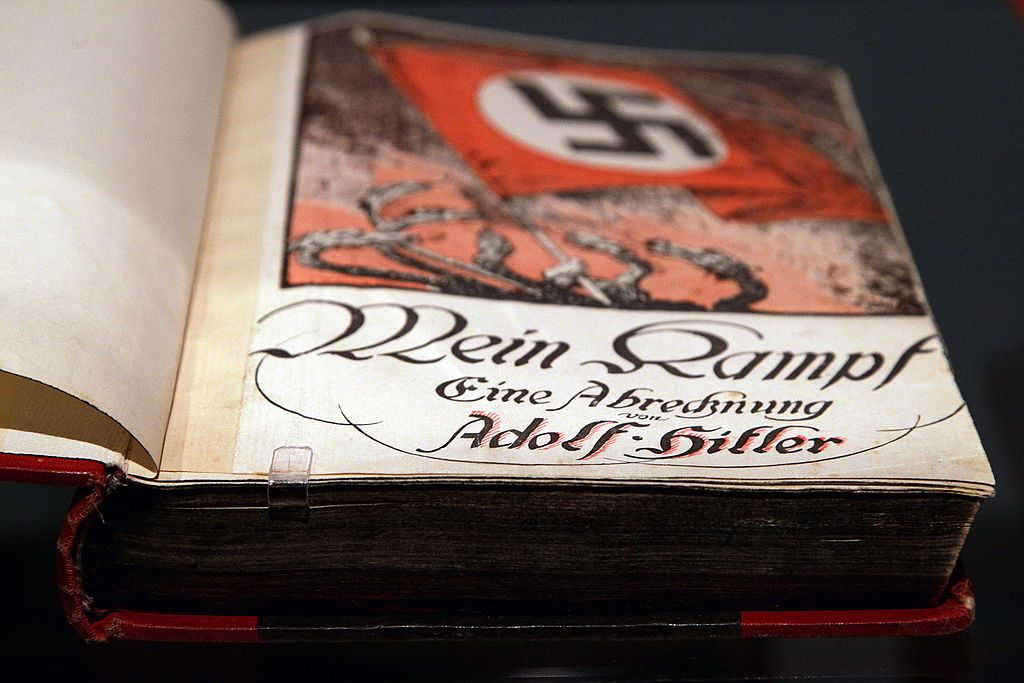
A critical version of Hitler's notorious autobiography, "Mein Kampf," is now a best-seller in Germany.
The autobiography has sold about 75,000 copies and spent 35 weeks on the German "Der Spiegel" best-seller list in 2016, The New York Times reported. The book had been banned in Germany for seven decades; the state of Bavaria held the copyright until the end of 2015 and continually thwarted efforts to republish the book. But the copyright expired Dec. 31, 2015, and the new edition of the book was published immediately after the copyright expiration, at the beginning of 2016.
The publishing of "Mein Kampf" (or "My Struggle") was not without controversy. Some argued that the book, which laid out Adolf Hitler's poisonous ideology about an Aryan master race, would fuel the rise of white supremacists and neo-Nazis. Others countered that the work offered important insight into one of the darkest periods in German history. Besides that, people were already finding ways to read the book, according to a statement from the new edition's publisher, the Institute for Contemporary History, in Munich.
"Despite all the debates about republication, Hitler's book has long been accessible in a variety of ways: on the shelves of used book shops, in legally printed English translations or a mouse click away on the Internet – 'Mein Kampf' is out there and every year manages to find new readers, agitators and commercial profiteers," the publisher wrote in a statement. "The task of an annotated critical edition is to render the debate objective and to put forward a serious alternative, a counter-text to the uncritical and unfiltered dissemination of Hitler's propaganda, lies, half-truths and vicious tirades."
The original version of "Mein Kampf" was written in two volumes between 1924 and 1926, according to the Institute for Contemporary History. Hitler wrote chunks of the first volume while imprisoned after his failed coup attempt in 1923; he completed the remaining pieces, which focus on his ideology and the political beliefs of the National Socialists, or Nazis, while at his mountain retreat.
"Perhaps never in history did a ruler write down before he came to power what he was to do afterwards as precisely as Adolf Hitler. For that reason alone, the document deserves attention," historian Eberhard Jäckel wrote in 1981, as noted by the Institute for Contemporary History. Once Hitler rose to power in 1933, the book's popularity soared, and by the end of 1945 it had sold 12 million copies and had been translated into 18 languages, according to the institute.
The annotation aims to answer questions such as: What were Hitler's aims in writing this book? What social support did Hitler's assertions have among his contemporaries? And how can one counter-fight and defang such venomous ideology? according to a statement from the Institute for Contemporary History in Munich.
Sign up for the Live Science daily newsletter now
Get the world’s most fascinating discoveries delivered straight to your inbox.
Originally published on Live Science.

Tia is the managing editor and was previously a senior writer for Live Science. Her work has appeared in Scientific American, Wired.com and other outlets. She holds a master's degree in bioengineering from the University of Washington, a graduate certificate in science writing from UC Santa Cruz and a bachelor's degree in mechanical engineering from the University of Texas at Austin. Tia was part of a team at the Milwaukee Journal Sentinel that published the Empty Cradles series on preterm births, which won multiple awards, including the 2012 Casey Medal for Meritorious Journalism.











